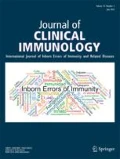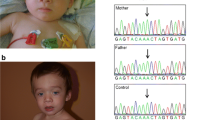Abstract
Activated PI3K δ syndrome (APDS) is a primary immunodeficiency caused by heterogeneous germline gain-of-function mutations which ultimately lead to the hyperactivation of the phosphoinositide-3-kinase δ (PI3K δ). PI3K δ exists as a heterodimer composed of a catalytic and a regulatory subunit. APDS type 2 is caused by mutations in the PIK3R1 gene affecting the p85α regulatory subunit. SHORT syndrome is a rare multisystem disorder characterized by short stature, hyperextensible joints, ocular depression, Rieger anomaly, and tooth eruption delay. The primary causes of SHORT syndrome are heterozygous loss-of-function mutations in the PIK3R1 gene. The combination of APDS2 and SHORT syndrome is rare, with few cases reported to date. Here we describe a 17-year-old female with phenotypic features consistent with SHORT syndrome and history of sinopulmonary infections and hypogammaglobulinemia. Invitae immunodeficiency panel genetic testing revealed a pathogenic loss-of-function variant in an intronic splice site in the gene PIK3R1 (c.1425 + 1G > C). This pathogenic variant had been previously associated with APDS2; however, it had not been associated with SHORT syndrome. The exact mechanisms linking both conditions are yet to be identified. This case report emphasizes the importance of screening for comorbidities associated with SHORT syndrome in APDS2 patients and vice versa.

Similar content being viewed by others
References
Angulo I, Vadas O, Garcon F, Banham-Hall E, Plagnol V, Leahy TR, et al. Phosphoinositide 3-kinase delta gene mutation predisposes to respiratory infection and airway damage. Science. 2013;342:866–71.
Deau MC, Heurtier L, Frange P, Suarez F, Bole-Feysot C, Nitschke P, et al. A human immunodeficiency caused by mutations in the PIK3R1 gene. J Clin Invest. 2014;124:3923–8.
Lucas CL, Kuehn HS, Zhao F, Niemela JE, Deenick EK, Palendira U, et al. Dominant-activating germline mutations in the gene encoding the PI(3)K catalytic subunit p110delta result in T cell senescence and human immunodeficiency. Nat Immunol. 2014;15:88–97.
Lucas CL, Zhang Y, Venida A, Wang Y, Hughes J, McElwee J, et al. Heterozygous splice mutation in PIK3R1 causes human immunodeficiency with lymphoproliferation due to dominant activation of PI3K. J Exp Med. 2014;211:2537–47.
Crank MC, Grossman JK, Moir S, Pittaluga S, Buckner CM, Kardava L, et al. Mutations in PIK3CD can cause hyper IgM syndrome (HIGM) associated with increased cancer susceptibility. J Clin Immunol. 2014;34:272–6.
Takeda AJ, Zhang Y, Dornan GL, Siempelkamp BD, Jenkins ML, Matthews HF, et al. Novel PIK3CD mutations affecting N-terminal residues of p110delta cause activated PI3Kdelta syndrome (APDS) in humans. J Allergy Clin Immunol. 2017;140(4):1152–6.
Heurtier L, Lamrini H, Chentout L, Deau MC, Bouafia A, Rosain J, et al. Mutations in the adaptor-binding domain and associated linker region of p110delta cause activated PI3K-delta syndrome 1 (APDS1). Haematologica. 2017;102(7):e278–81.
Wentink M, Dalm V, Lankester AC, van Schouwenburg PA, Schölvinck L, Kalina T, et al. Genetic defects in PI3Kdelta affect B-cell differentiation and maturation leading to hypogammaglobulineamia and recurrent infections. Clin Immunol. 2017;176:77–86.
Dornan GL, Siempelkamp BD, Jenkins ML, Vadas O, Lucas CL, Burke JE. Conformational disruption of PI3Kdelta regulation by immunodeficiency mutations in PIK3CD and PIK3R1. Proc Natl Acad Sci U S A. 2017;114(8):1982–7.
Conley ME, Dobbs AK, Quintana AM, Bosompem A, Wang YD, Coustan-Smith E, et al. Agammaglobulinemia and absent B lineage cells in a patient lacking the p85alpha subunit of PI3K. J Exp Med. 2012;209(3):463–70.
Deane JA, Kharas MG, Oak JS, Stiles LN, Luo J, Moore TI, et al. T-cell function is partially maintained in the absence of class IA phosphoinositide 3-kinase signaling. Blood. 2007;109:2894–902.
Elgizouli M, Lowe DM, Speckmann C, Schubert D, Hülsdünker J, Eskandarian Z, et al. Activating PI3Kdelta mutations in a cohort of 669 patients with primary immunodeficiency. Clin Exp Immunol. 2016;183:221–9.
Elkaim E, Neven B, Bruneau J, Mitsui-Sekinaka K, Stanislas A, Heurtier L, et al. Clinical and immunologic phenotype associated with activated phosphoinositide 3-kinase delta syndrome 2: a cohort study. J Allergy Clin Immunol. 2016;138:210–8 e9.
Coulter TI, Chandra A, Bacon CM, Babar J, Curtis J, Screaton N, et al. Clinical spectrum and features of activated phosphoinositide 3-kinase delta syndrome: a large patient cohort study. J Allergy Clin Immunol. 2017;139:597–606 e594.
Chiriaco M, Brigida I, Ariganello P, di Cesare S, di Matteo G, Taus F, et al. The case of an APDS patient: defects in maturation and function and decreased in vitro anti-mycobacterial activity in the myeloid compartment. Clin Immunol. 2017;178:20–8.
Kracker S, Curtis J, Ibrahim MAA, Sediva A, Salisbury J, Campr V, et al. Occurrence of B-cell lymphomas in patients with activated phosphoinositide 3-kinase delta syndrome. J Allergy Clin Immunol. 2014;134:233–6.
Michalovich D, Nejentsev S. Activated PI3 kinase delta syndrome: from genetics to therapy. Front Immunol. 2018;9:369.
Gorlin RJ, et al. Malformation syndromes. A selected miscellany. Birth Defects Orig Artic Ser. 1975;15(2):39–50.
Koenig R, Brendel L, Fuchs S. SHORT syndrome. Clin Dysmorphol. 2003;15(1):45–9.
Chudasama KK, et al. SHORT syndrome with partial lipodystrophy due to impaired phosphatidylinositol 3 kinase signaling. Am J Hum Genet. 2013;15(1):150–7.
Dyment DA, et al. Mutations in PIK3R1 cause SHORT syndrome. Am J Hum Genet. 2013;15(1):158–66.
Thauvin-Robinet C, et al. PIK3R1 mutations cause syndromic insulin resistance with lipoatrophy. Am J Hum Genet. 2013;15(1):141–9.
Aubin D, Gagnon A, Sorisky A. Phosphoinositide 3-kinase is required for human adipocyte differentiation in culture. Int J Obes. 2005;29:1006–9.
Petrovski S, Parrott RE, Roberts JL, Huang H, Yang J, Gorentla B, et al. Dominant splice site mutations in PIK3R1 cause hyper IgM syndrome, lymphadenopathy and short stature. J Clin Immunol. 2016;36:462–71.
Bravo García-Morato M, García-Miñaúr S, Molina Garicano J, Santos Simarro F, del Pino Molina L, López-Granados E, et al. Mutations in PIK3R1 can lead to APDS2, SHORT syndrome or a combination of the two. Clin Immunol. 2017;179:77–80.
Avila M, Dyment DA, Sagen JV, St-Onge J, Moog U, Chung BHY, et al. Clinical reappraisal of SHORT syndrome with PIK3R1 mutations: toward recommendation for molecular testing and management. Clin Genet. 2016;89:501–6.
Klatka M, Rysz I, Kozyra K, Polak A, Kołłątaj W. SHORT syndrome in a two-year old girl – case report. Ital J Pediatr. 2017;43(1):44.
Author information
Authors and Affiliations
Contributions
The manuscript was written by Lourdes G. Ramirez, and all authors commented on all versions of the manuscript. All authors read and approved the final manuscript.
Corresponding author
Ethics declarations
Conflict of Interest
Dr. Hanadys Ale is now a consultant for Pharming Healthcare Inc. The other authors declare that they have no conflicts of interest.
Consent to Participate
Written informed consent was obtained from legal guardian to submit this case report to the journal.
Additional information
Publisher’s Note
Springer Nature remains neutral with regard to jurisdictional claims in published maps and institutional affiliations.
Rights and permissions
About this article
Cite this article
Ramirez, L., Tamayo, W. & Ale, H. APDS2 and SHORT Syndrome in a Teenager with PIK3R1 Pathogenic Variant. J Clin Immunol 40, 1020–1025 (2020). https://doi.org/10.1007/s10875-020-00843-1
Received:
Accepted:
Published:
Issue Date:
DOI: https://doi.org/10.1007/s10875-020-00843-1




